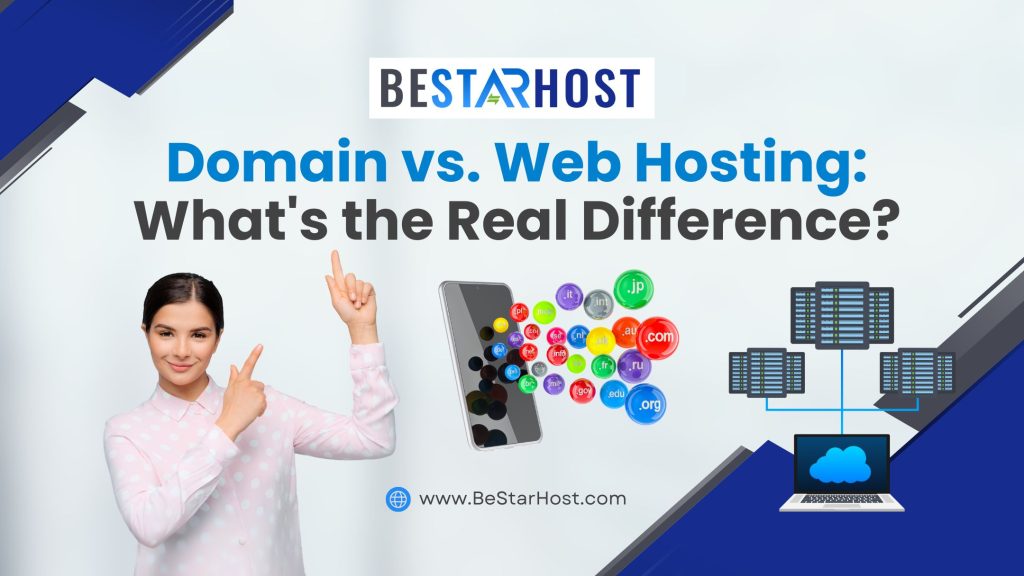
When launching a website, two crucial terms often confuse beginners: domain and web hosting. Although both are essential components of a website, they serve completely different functions. Understanding the difference between domain and hosting will help you make smarter decisions for your online presence.
What Is a Domain Name?
A domain name is the human-readable address of your website. It’s what users type into their browser to visit your site. For example, in www.example.com, “example.com” is the domain name.
Think of a domain name as your website’s “home address” on the internet. It directs users to your site’s content in the same way a home address leads people to your house.
How Domain Names Work
Domain names work through the Domain Name System (DNS), which connects domain names to IP addresses — numerical addresses that computers use to locate each other on the internet. ICANN oversees the global domain name system to ensure proper management and security.
What Is Web Hosting?
Web hosting refers to the server space where all your website files, images, databases, and code are stored. When someone visits your site, the hosting server delivers the content to their browser.
Hosting providers offer different types of services such as shared hosting, VPS hosting, cloud hosting, and dedicated hosting depending on your site’s needs. For more information, see our post on cost vs. performance of different hosting types.
How Web Hosting Works
When you sign up for a hosting service, you’re renting space on a server that is connected to the internet 24/7. This server holds all your website data and ensures it’s accessible at any time by any visitor around the globe.
Domain vs Web Hosting: A Simple Analogy
Imagine your website as a house:
- The domain name is the street address.
- The web hosting is the actual plot of land where the house (your website files) sits.
Both are essential. Without a domain name, users won’t know how to find your site. Without hosting, there’s no place to store your site content.
The Key Difference Between Domain and Hosting
The main difference is:
- A domain name is the address of your site.
- Web hosting is the space where your website files live.
While they work hand-in-hand, you can buy them from separate providers or together from an all-in-one platform.
Do You Need Both Domain and Hosting?
Yes. To make your website publicly accessible, you need both:
- A domain so people can find your site.
- Hosting to serve your website content when someone visits your domain.
How Domain and Hosting Work Together
Once you register a domain and purchase hosting, you connect the two by updating your domain’s DNS settings to point to your hosting provider. This process allows your domain to serve the content stored in your web hosting account.
In technical terms, this tells the internet that when someone types in your domain, it should pull files from your hosting server.
Types of Domain Names
Domain names come in various extensions and forms:
- .com – The most common and preferred extension.
- .org, .net, .info – Popular alternatives based on use-case.
- Country-specific domains like .in, .uk, .us – Often used by local businesses or region-specific services. WHOIS Lookup tools can help you find availability.
Types of Web Hosting
There are several types of hosting options available, depending on the size and scope of your website:
- Shared Hosting – Budget-friendly and ideal for beginners.
- VPS Hosting – More power and control, suitable for growing sites.
- Dedicated Hosting – High performance with full server access.
- Cloud Hosting – Scalable and flexible for dynamic traffic needs.
Need help selecting a hosting plan? Check out our article on budget-friendly WordPress hosting with essential features.
Can You Move Your Domain or Hosting Later?
Yes. If you registered your domain with one company but want to change hosting providers later, you can do so. Likewise, you can transfer your domain to another registrar if needed. Just make sure your domain is unlocked and you have the transfer code (EPP).
Costs Involved
Both domain names and hosting services come with annual or monthly fees:
- Domain names usually cost around $10–$20 per year.
- Web hosting can range from $3/month for shared hosting to hundreds of dollars for dedicated servers.
Some hosting providers offer free domains for the first year as part of their hosting package. Learn more about pricing in our cost vs. performance hosting guide.
Frequently Asked Questions
1. Can I buy a domain without hosting?
Yes, you can purchase a domain and park it for future use without connecting it to a hosting service. See our guide on private domain registration to protect your information.
2. Can I host a website without buying a domain?
Technically yes, but your site would only be accessible via an IP address or temporary URL provided by the host—not ideal for branding or SEO.
3. Do I need to renew both?
Yes. Domain names and hosting are two separate services and require regular renewals to remain active.
Choosing the Right Provider
Understanding the domain name vs hosting service distinction helps you make informed decisions when building a website. Choose a reliable provider that offers both domain registration and hosting in one package for ease of use.
Many platforms also offer integrated tools to manage how domain and hosting work together, including DNS settings, email, backups, and security features.
Whether you’re a blogger, business owner, or eCommerce entrepreneur, getting the foundation right will set you up for online success.
Your domain name is your address. Web hosting is your storage. Together, they power your digital presence.
